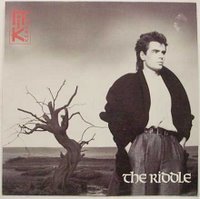Paris Hilton, "Screwed" (2006)About six years ago, Boy George expressed some unhappiness about people who defended Eminem by pointing out that his music should be separated from his personality, especially since so many of his songs are sung in character. Although he grudgingly agreed, like
a good New Critic suspicious of the intentional fallacy, that you can't always judge a song (or, more generally, art) by its singer, he also fretted about the slippery slope this seems to create.
"I worry that if Hitler or Pol Pot made a good dance record, people would probably buy that as well," Boy George observed. "Where do you draw the line?"Last week saw the release of
Paris, an album by a new and unknown singer, making her recording debut, named Paris Hilton. I kid, of course. While this is her debut, Paris is hardly unknown; Paris is...well,
you know who Paris is. I don't mean -- I don't
entirely mean -- to suggest that The Heiress (as TV ads for the album here label her, like suddenly we're in a Henry James novel?) is in any way comparable to Adolf or Pol (Pol? Pot?), but she is certainly someone whom many right-thinking people in the 21st century will find objectionable, for various reasons.
There is, to begin with the less substantiated, the possibility that she is casually racist. Even keeping in mind how things are exaggerated for TV, Paris also appears to be, judging from her appalling reality series
The Simple Life, how you say, a rich privileged bitch who would sooner spit on than look at someone not in her social class. There is also that sex tape, although here the worst thing you can say -- though not the
only thing you can say, since some of the furore over it seems to be misogynistic outrage about female sexuality -- is that she has terrible taste in men. Who doesn't? But most of all, what chaps many asses about Paris is probably just the fact that she is such an unremitting famewhore, willing to do anything just to be famous.
Paris therefore arrives as an intriguing test case for music lovers who would like to be able to think of music in and of itself, without letting the singer's persona and/or personality influence that appreciation. Nowadays, we tend to call such music lovers either
anti-rockists, or
poptimists. (Although one thing the Boy George-Eminem incident reminds us of is that the defense of "music for music's sake" has never been the exclusive domain of
pop lovers, unless you expand "pop" to its larger meaning of "whatever is popular." In the late 90s, after all, Boy George was speaking from a moment not just when Eminem was big, but when the charts were filled with hits mostly from "faceless" dance acts.)
But to call
Paris a test case is not to suggest that the album and Ms. Hilton should
only be measured with a poptimism yardstick. If it is ridiculous to reject
Paris on the basis of Paris, then it should be as absurd to claim that not liking the album makes you rockist. Hardly needs to be said? Surely no one is silly enough to reduce things to black-and-white that way? Except that
Plan B's baiting review more or less goes down that route. Starting with the assertion that "Paris Hilton is the perfect litmus test of one's ability to be a cultural commentator in 2006," the writer goes on to sketch things out with deceiving confidence. "Essentially, if you are one of the (sadly) many with a kneejerk prejudice against our heroine and her nascent-but-magnificent singing career, you may as well give up now; start buying
Word and James Blunt albums, for there's no hope for you any more if you don't get exactly why she's so important." And why is she important? The rest of the review only trafficks in generalities, speaking of her "light, breathy voice" and "inability to put a foot wrong," or simply aping her album's vocabulary ("she's got choruses which burst into life like stars exploding into fireworks," although these stars are presumably not blind). In other words, for
Plan B, we should like Paris because not liking Paris makes you an idiot. Illuminating! Even if we accept that Paris is "important," is that the only question to ask? How about: is the album any good?
I'm perhaps using
Plan B as a bit of a strawman, though the question implicitly posed therein -- what kind of asshole are you to not like this shit? -- is far from isolated. And maybe the problem the
Plan B blurb illustrates is something that many reviews of
Paris have already managed, consciously or otherwise, to sidestep. Indeed, there is a fair bit of critical consensus on the album, namely: the production is quite impeccable; the songcraft varies; the singing is almost always awful, except when the producers managed to, ahem, correct for Paris's shortcomings. Nevertheless, what some of the reactions to
Paris -- both "rockist" reviews that trash the album, and (supposedly) "poptimistic" reviews that embrace it -- demonstrates is the way the ideological standoff of rockism/poptimism creates not just a set of false standards, but a kind of
double-bind.
Paris comes with, not one, but at least two sets of baggage. (Posh Louis Vuitton matching baggage, no doubt.) To submit to either side of the divide unthinkingly is to give in to its ideological power, of which there is no "outside."
All I've been suggesting, ultimately, that there is a specific way to think about Paris and her ilk that is completely unproductive, that in fact reinscribes the things it purports to challenge. It would seem logical for me to end by setting out some alternatives -- ways that might help us out of the idiot's quagmire whereby liking
Paris makes you a particular kind of music-listener and person, and not liking it makes you another -- but perhaps that's impossible and/or unnecessary. As I've noted, there are a good number of reviews that do try to deal with
Paris on terms less dictated and predetermined. But we all want constructiveness, so I will at least sketch one schema -- which I'm not suggesting should be the only one -- by which I make sense of the album (and, um, incidentally, conclude that it's not a good one).
I've long been interested in gauging how albums or songs work with or against a singer's persona -- say,
Rachel Stevens's "blank boringness," or
Kate Bush's "wacky insanity", to pick just two examples -- and this for me makes for a less limited way to think about
Paris. Ms. Hilton, as I've already noted, has quite a persona, and a not-especially-positive one. The album is most banal, I think, when it embraces or confirms what we think we know of that "identity." The two opening tracks ("Turn It Up" and "Fighting Over Me"), as well as the closer (a
Showgirls-worthy cover of "Do You Think I'm Sexy?"), for instance, are all about how HOTT Paris is, and the former songs even couch that sick-making sentiment in a hip-hop idiom. At best, these songs are boring or laughable. They lack any kind of
frisson --
frisson that could come from playing with aspects Paris's identity in more imaginative ways that playing
to it -- that is arguably necessary for good pop.
"Stars Are Blind" gives us a glimmer of such
frisson, even if it does so via a well-trodden path. In the gentle ska single, Paris announces: "Some people never get beyond their stupid pride/But you can see the real me inside." In other words:
I'm not the shallow idiot you think I am! I need love too! It is of course the oldest protest in the book, and we may not -- probably should not -- believe it for real, but we're talking about a pop
persona here. But what lifts the song slightly beyond cliché is an odd line that doesn't entirely make logical sense. At the end of each chorus, Paris sings: "Baby [or it might be "maybe"; Ms. Mushmouth makes it hard to tell] I'm perfect for you." It's a strange line, because we hadn't known that what was up for debate was whether Paris is right for the man she's singing to. The song, after all, has been about how how great
he is, and hence how right
he is for
her. Shouldn't the line logically be, "Baby you're perfect for me"? But no; instead, the line slips into a kind of unconscious narcissism. Enough about you, let's talk about me. If we were uncharitable, we could point to this as evidence of Paris's self-centeredness. But I actually find the slip quite charming, precisely because it toys with our, or even creates a kind of, uncertainty within the song. Is Paris trying to rehabilitate her image as a spoilt brat, by resorting to the "I just wanna be loved" defense? Is she wittily (!) undermining that defense by slipping in a hint that it's ultimately about her? Or unconsciously doing so? It's hard to tell, but in being difficult, the song suspends, if only for a moment, Paris's "identity," and restores to her a modicum of mystery.
Even better is "Screwed," the chugging electropop song which, via leaks, has been floating around for a few years now but gets its glossiest and best production on the album. Here, instead of attempting, as "Stars Are Blind" does, to create some tantalizing doubt about "who Paris is," the song signals its recognition of what we think of her, and then turns that recognition into its hook. "Since I'm already screwed, here's a message to you," Paris sings. Of course, the title word works on several levels, although both has the same upshot: well, I already know what you (the potential lover/the audience) think of me (fucked/fuuuucked), so I won't even bother to fight it. Instead, the gloves come off, and the singer proclaims that she will use that screwed status to her advantage. "When you need someone just to have a little fun," she announces in the middle eight, "I could be the perfect girl for you to ruin." In
early versions of the song, the line seems to end with "...for you to love," but "ruin" is so much more brilliantly apt. It winks in the direction of sexual ruin, but still retains, dare I say it, a
touching but tongue-in-cheek notion of being emotionally devastated. (I can hear Neil Tennant writing a song with a title like "I've Been Ruined"; or, think about the Shakespear's Sister song that does exist, called
"You Made Me Come To This.") Yet, at the same time, the track also holds in abeyance the possibility that, once again, we're talking about affection, that what the "already ruined Paris" wants is, aww, lurrrve. "My heart's wide open." In such moments -- "baby I'm perfect for you," the entirety of "Screwed" -- the album actually looks right at our belief that we've got Paris pegged, and toys with those beliefs.
I mean, aside from these two tracks, and "Nothing In This World" (in which
Dr. Luke rewrites, for the umpteenth time, Kelly's "Since U Been Gone" by way of The Veronicas' "4Ever"), the rest of the album is hideous. Hideous. That seems as good a point as any on which to end, and better than most.



